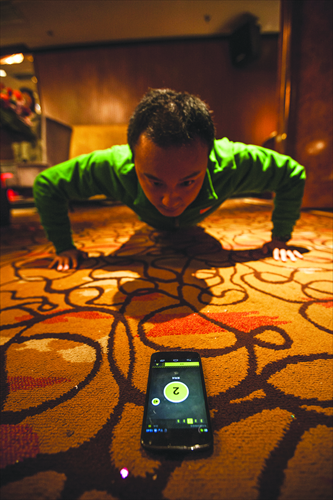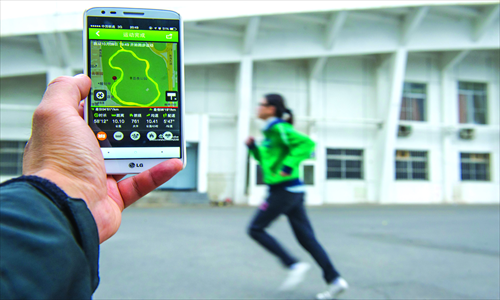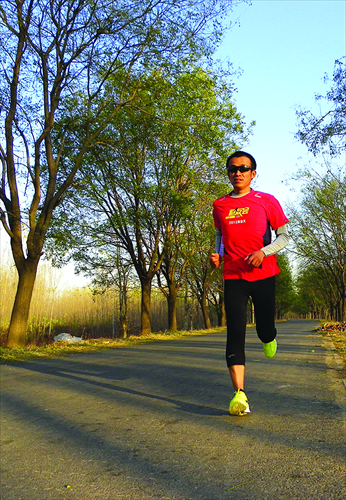Gadgets muscle up

Fitness apps have been a hit among Chinese smartphone users since last year, but tech and health experts are proving harder to win over. Photo: Li Hao/ GT
The first sound Zhang Suhai hears each morning is his cell phone's alarm tone just before dawn. Still half-asleep, he gets dressed and laces up his sneakers before stumbling out of his apartment building. The 45-year-old construction project manager performs a few light stretches in preparation for his daily 25-kilometer run in Tongzhou district.
But Zhang isn't alone for his grueling workout. Before he sets off, he thumbs his Android smartphone and activates a fitness app to measure the time, distance and speed of his run.
"I started using fitness apps three years ago. I initially used foreign ones like Nike+ and Mizuno, but it was inconvenient because they were only available in English. I now prefer to use a Chinese app that has a more accurate global positioning system (GPS)," Zhang said in reference to Codoon, a fitness tech startup that also produces wearable gadgets.
After his run is over, Zhang uploads his data to his social network accounts to share his workout with others and reflect on his performance.
Chinese fitness apps have soared in popularity over the past year as more smartphone users seek to log and share their workouts. The convenience of having a free or cheap pocket-sized personal trainer is appealing to many in the digital age, but health and tech experts warn apps can encourage potentially harmful fitness regimes and result in personal data being leaked.
Late yet rapid development
Hundreds of fitness apps are available for Apple and Android devices. Most either record workout details or provide exercise tutorials.
The former requires users to enter personal information to calculate calories burned during workouts. The latter teaches users exercises targeting certain body areas or offers guidance for other exercises, such as yoga or Pilates.
Codoon is one of China's biggest fitness app developers, boasting more than 9 million active users. Liang Yun, the company's chief operating officer, claims Chinese fitness apps blossomed relatively late.
"The rapid yet recent boom of fitness apps in China can be attributed to growing public health awareness. People want the tools and lessons to get fit," said Liang. "Another reason is that China has hosted many international sporting events, which has encouraged more people to take their own fitness more seriously."
Problems with privacy
Codoon users are required to enter their age, height and weight before recording a workout. The app can also be linked to social network accounts on Sina and Tencent Weibo, Renren and WeChat to allow users to post workout results. Routes cycled, ran or walked that are tracked using GPS are shared only with a user's Codoon friends by default, but data posted to social networks can potentially attract an unwelcome audience.
The onus is on users not to share more information than they feel comfortable with, said Liang.
"If your jogging route is near your residential compound, it's better not to share such information. But if you jog at a popular exercise venue, such as the Beijing Olympic Forest Park, there's no harm in sharing your workout," he said.
A study by US web analytics and privacy firm Evidon Research last month revealed that the 20 most popular apps transmit users' personal information to nearly 70 companies. One of these apps, MapMyRun, was found to pass on users' data to 11 companies, including advertising firms.
Personal data theft is a growing problem in China. Findings from a study by the China Internet Network Information Center released in March 2012 showed 60 percent of Web users had lost personal data online in the past.
Xin Haiguang, an observer of Internet trends, warned that personal information security is a legitimate worry for fitness app users, particularly given the industry's infancy.
"Any data stored on a cloud-based network inevitably arouses concerns about leaking. But avoiding use [of fitness apps] because of this is akin to giving up eating for fear of choking. Users should enjoy the benefits first," said Xin.
Xu Xing, deputy manager of Chinese fitness tech giant Ledong, said the startup has spared no expense ensuring data security for its more than 70 million users. Xu said the company has an eight-person team assigned to protecting users' data.
"We spent more than 1.8 million yuan ($294,377) last year on data protection," said Xu. "We supervise data flow and server activity. Once we identify a problem, our software fixes any bugs and blocks would-be hackers."

Details of a run recorded by fitness app Codoon. Photo: Li Hao/GT

Zhang Suhai on his morning jog. Photo: Courtesy of Zhang Suhai
Catering to the Chinese market
Liang said an advantage of Chinese fitness apps is their compatibility with domestic social networks, such as Sina Weibo and Renren. MapMyRun and MapMyRide, two of the biggest foreign running and cycling apps, only allow users to share workout results on Facebook and Twitter, both of which are blocked in China.
Cost is another barrier for downloading foreign fitness apps. Popular foreign apps including iFitness, Calorie Tracker, Men's Health Workouts and RunKeeper Pro cost between $1.99 and $9.99. By comparison, China's two biggest fitness apps, Codoon and Ledong, are both free.
But competition between the pair is fierce, with Ledong unsuccessfully attempting to take over Codoon for 7 million yuan last year, said Xu.
When apps don't work out
Like many people who make New Year's resolutions to get fit, Li Xiaohao decided to enlist the help of a fitness app. Li, 31, downloaded the Push Ups app for free on his Android smartphone.
He found it easy to use despite being in English, but soon gave up out of frustration.
"In the first five months, I used it five times per week. But when I became ill I was unable to exercise for several days, so my training schedule ended," said Li.
Jin Wei, 25, deleted tutorial fitness app Jianshen Baodian soon after downloading it because its workout instructions were "too general."
"I like going to the gym, but workouts for building muscle depend on your own personal condition. I'd rather get professional guidance from a personal trainer at the gym than rely on an app," said Jin.
Wen Tao, a personal trainer with five years' experience at Hosa Fitness in Zhongguancun, Haidian district, said fitness apps will never make his profession obsolete.
"Personal trainers specialize in designing workout schedules that suit an individual. If someone bases their entire fitness regime on an app, their workout can be worthless," warned Wen.
"Furthermore, training too hard without knowing when to rest can strain muscles and ligaments."
China's top 5 free iOS fitness apps
1) Runtastic Six Pack (trains abominable muscles)
2) JJKK (weight loss)
3) Codoon (records workout data)
4) Dongdong Jibu (records workout data)
5) The 7-Minute Workout (whole-body workout)
Source: Downjoy Mobile Games (ios.d.cn)